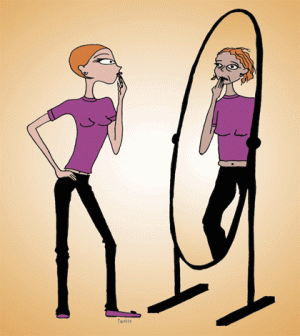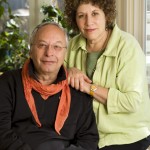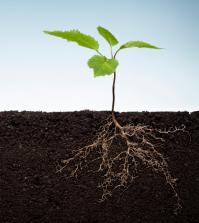- A Mother’s Journey Through Parenthood and AcceptancePosted 4 days ago
- How to Avoid Common Missteps in Household Money ManagementPosted 1 week ago
- Mothering in a Fractured TimePosted 3 weeks ago
- Beneath the Surface: Revealing Life’s Goals nurtured from a Spiritual SeedPosted 3 weeks ago
- How We Kept Marital Peace while Traveling the World with Our KidsPosted 1 month ago
- How I Coped with Feeling Lost in a Changing SocietyPosted 1 month ago
If There Is No Solid Me Then Who Am I?

By Ed and Deb Shapiro
The future is a concept—it doesn’t exist! There is no such thing as tomorrow! There never will be because time is always now. ~Alan Watts
When Deb was a teenager in London, her mother was editor of The Middle Way, the journal of the British Buddhist Society. As a result, Deb met some fascinating people, such as the Zen philosopher Alan Watts, who was writing the foreword to her mother’s book when he died, and Douglas Harding, the author of On Having No Head, who had spontaneously stopped thinking and realized that he had no head:
“I stopped thinking. Reason and imagination and all mental chatter died down. It was a vast emptiness vastly filled, a nothing that found room for everything—room for grass, trees, shadowy distant hills… I had lost a head and gained a world.” ~Douglas Harding
Many of us experience having no-head – or no-mind – in those moments when a sense of ourselves as a separate, identifiable individual seems to disappear and merge with everything around us. It’s as if boundaries have dissolved, like waves dissolving into the sea, and in their place we become the clouds in the sky and the birds singing in the tree and the flowers at the foot of the tree.
If we contemplate, ‘Who am I?’ most of us believe, “This is me, this is my body, I see myself very clearly.” We identify ourselves with our thoughts and feelings, believing these constitute “me” just as the body is “me.” Our attachment to form is due to the concept that there is a separate you and a separate me, and all emotions, both negative and positive, grow out of this assumption of duality. And on a relative level this is true.
“I use inquiry as a way of getting the mind to turn inward to the silence,” says spiritual teacher Gangaji. “It could be the question, ‘Who am I?’ Or, ‘Where is silence?’ Rather than sending the mind outward to gather information, it is sending the mind inward to question our basic assumptions of who we think we are.”
When we presume that our sense of a solid self is separate from anything or anyone else, others are seen as “not-me.” But is it possible to find a “me” that exists independent of anything else? And can “me” be found somewhere special? Is there one particular part of ourselves that is more “me” than another? Is it possible to find the “I” as a solid thing to which we can point and say, this is “me?”
When we presume that our solid self is separate from anything or anyone else, then others are seen as “not-me.” But when we understand that the self is constantly changing, interconnected and interrelated, we see that not only is there no solid “me” but there is no solid “you” either.
“I thought inside was a solid Bob, that there was a solid Bob-person in here, but when I look for that Bob, I can’t find any such thing. Bob is a word; it is a name only. I am empty of a solid Bob, but I am full of the incredible rich process of body and mind as multiple perspectives and angles,” says Professor Robert Thurman.
“The material like this table that I can put my knuckle on now is just as much emptiness as the air between my knuckle and the table where my hand is poised. There is no absolute solid, and there is no absolute intangible. When you look for the solid core of anything, you find only emptiness, or non-duality.”
The mind is likened to the sky that is inherently empty. It may contain clouds, rain, tornados, thunder or lightning, sunshine and stars, but behind all these various manifestations, the sky is just sky. In the same way, we contain anger, grief, fear, joy, happiness, yet we are not these.
Non-duality, the wisdom of no-mind, arises when there is no longer a sense of “me” or “me-ness,” no ego-bound person where the “me-self” is the center of the universe. With no awareness of “I,” there is just awareness. When we meditate we discover we are not the mind, nor the content within the mind, but the vastness of no-mind.
“Meditation for me is an amazement that whatever I am contemplating is there at all,” says author Anne Bancroft.
“How incredible that spring comes and the grass grows, or that a cup of coffee awaits me on the table, even that a table exists! It is awareness of the miracle that anything is. And I experience that it is, before I come to what it is. It is totally important in my contemplation to be filled by that it is.
“But whatever the mystery of its being-ness, the table also has a conventional existence here and now, an existence within language. So the second part of my meditation is to do with knowing its everyday life: a table that is both a mystery and a table that is here and now.”
*********
 Ed & Deb are the authors of newly released: The Unexpected Power of Mindfulness & Meditation. Deb is the author of Your Body Speaks Your Mind, now in 19 languages. They have six meditation CDs. See more at EdandDebShapiro.com
Ed & Deb are the authors of newly released: The Unexpected Power of Mindfulness & Meditation. Deb is the author of Your Body Speaks Your Mind, now in 19 languages. They have six meditation CDs. See more at EdandDebShapiro.com







